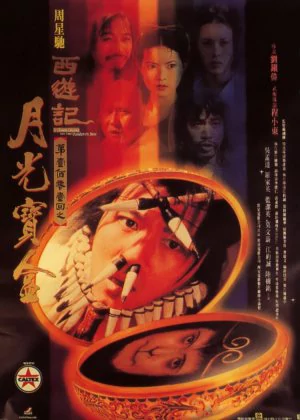A Chinese Odyssey: Part One - Pandora's Box
Movie details

Jeffrey Lau's A Chinese Odyssey: Pandora's Box [Sai Yau Gei: Dai Yat Baak Ling Yat Wui Ji - Yut Gwong Bou Haap] transformed from a critical flop into one of Hong Kong's penultimate cult films. Looking back it's pretty baffling to see how ill-received it was, looking at the film itself though it's really not that big of a surprise. This isn't exactly the kind of film that speaks greatly to critics. I saw it a long, long time ago and was pretty delighted by the madcap creativity on display back then, though I was a little uncertain how it would hold up after all this time. Only one way to find out.
![screen capture of A Chinese Odyssey: Part One - Pandora's Box [Sai Yau Gei: Dai Yat Baak Ling Yat Wui Ji - Yut Gwong Bou Haap]](/thumbs/img/articles/1200xauto/chinese-odyssey-1-1.webp)
The film is loosely based on Journey to the West, no doubt one of the most influential Chinese books ever written. There have been countless adaptations already and many more are bound to follow. Some are more serious (like Jianqi Huo's Xuan Zang), others are more fantasy-driven (usually the ones that put the Monkey King front and center). What most adaptations share though is that they are quite loose and only borrow the main characters and some key plot points, filling out the details as they please.
With Jeffrey Lau in the director chair (Hong Kong's master of parody) and Stephen Chow in the lead, it's no surprise that A Chinese Odyssey takes a more humorous approach. People expecting a serious, fantasy-driven version of the Monkey King's story are going to be sorely disappointed, Lau/Chow's daft and silly comedy takes center stage. The key is that it doesn't take away from the fantasy setting and the action, no doubt due to the well-oiled machine that was the Hong Kong film industry at that time, which could pump out films like this with their eyes closed.
The story follows the Monkey King, as he is banished to Earth after annoying Guanyin and his master, Longevity Monk. Once on Earth he becomes Joker, the leader of a small gang of bandits, remembering nothing of his past life. When Bak Jing-jing and Spider Woman run into Joker, he falls in love with Jing-jing, setting off a series of events that will jog Joker's memory. There's quite a bit of plot to wade through and a lot of it whizzes by at breakneck speed, but with such a strong focus on comedy you shouldn't worry too much if you end up missing out on some of it.
![screen capture of A Chinese Odyssey: Part One - Pandora's Box [Sai Yau Gei: Dai Yat Baak Ling Yat Wui Ji - Yut Gwong Bou Haap]](/thumbs/img/articles/1200xauto/chinese-odyssey-1-2.webp)
In the period between '85 and '95, Hong Kong made an insane amount of martial arts films, often back to back. There's a very consistent and increasingly refined style (frantic editing, blue light nights, agile cameras, floaty costumes) that characterizes these films and Lau makes excellent use of his crew's experience. A Chinese Odyssey looks slick and polished for a parody. Even though the special effects and sets look plenty fake, there's a visceral energy and aesthetic quality embedded in the visuals that makes it very easy to overlook any technical defects.
The soundtrack is probably the film's least notable aspect. Like most of its contemporaries, A Chinese Odyssey has a pretty decent, acceptable score that hits the right notes and provides ample backing, but it never demands too much attention. It's background noise that fills empty space and provides cookie cutter atmosphere, but you'll be hard-pressed to remember any of it once the film has finished. That's not necessarily a problem for this type of comedy, but it is a good indication that you're dealing with genre fare rather than true auteur cinema.
Star of the film is Stephen Chow. By the time he featured in this film he had fully established his particular style of comedy, something Lau was smart enough to exploit. Chow's timing, delivery and expressions are nothing less that hilarious, the only problem is that he set a pretty impossible bar for anyone who would try to follow in his footsteps. It's also lovely to see Man-Tat Ng (Chow's regular sidekick) beside him as the incarnation of Pigsy, as a comic duo these two are virtually unmatched. With talented people like Kar-Ying Law and Karen Mok fleshing out the secondary cast and a notable cameo of Jeffrey Lau (as "The Grapes"), there are absolutely no complaints about the cast.
![screen capture of A Chinese Odyssey: Part One - Pandora's Box [Sai Yau Gei: Dai Yat Baak Ling Yat Wui Ji - Yut Gwong Bou Haap]](/thumbs/img/articles/1200xauto/chinese-odyssey-1-3.webp)
The most impressive thing about A Chinese Odyssey is that it cycles through different genres and excels at all of them. Even though it's a comedy at its core, the martial arts scenes are sleek and dynamic, while the fantasy elements are creative, meticulously designed and properly executed. Usually films like these put all their eggs in one basket and skimp on the other genres, but because Lau can depend on such a well-oiled team; proficient in all genres on display here, the film feels incredibly smooth and effortless.
A Chinese Odyssey is entertainment in its purest form. The comedy is hilarious, the pacing is excruciating, the film rolls from one memorable scene to the next and the level of variation is exemplary. It's not difficult to see why this grew out to become one of the quintessential Hong Kong films of the 90s. Soon after the entire Hong Kong film industry would collapse on itself, but before it went out it ended its late 80s/early 90s martial arts/fantasy run on a high note. Fans of Stephen Chow, Hong Kong comedy and martial arts cinema owe it to themselves to give this one a shot.